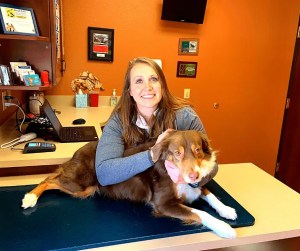
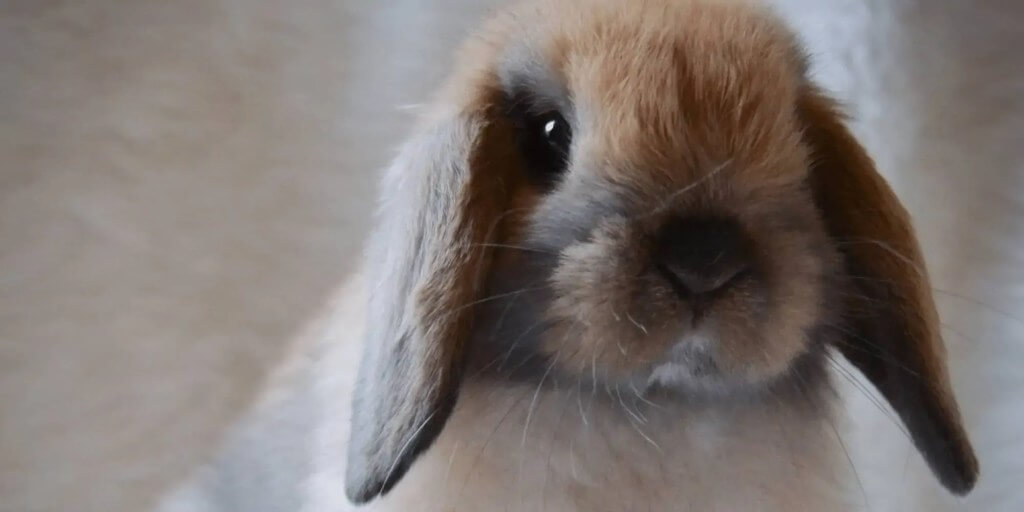
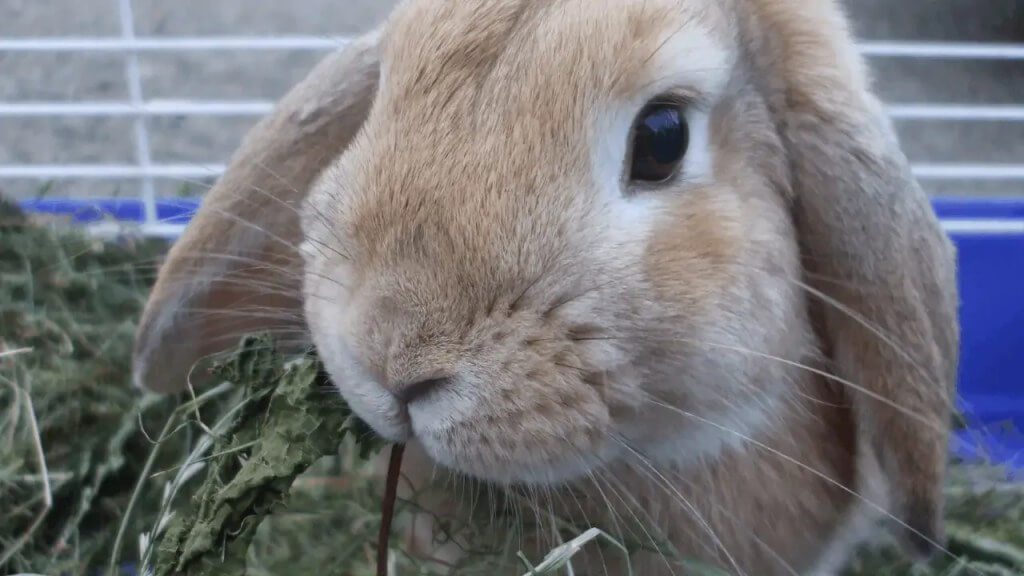
It can be challenging to find a health care provider for our bunny family members. It seems there are so many veterinarians that serve our other furry four-legged family members but not our bunny friends. While finding a good rabbit veterinarian can be challenging and distressing at times to find the right bunny match, there are several things we can do to make sure we find the right veterinarian that is knowledgeable and is experienced with these special family members.
If you prepare, do your research, and use trusted resources, there can be a lot less stress when these family members need rabbit veterinary care.
Proper Veterinary Care for Rabbits
It may seem like a lot of preparation to find a general and even an emergency veterinarian for your bunny family members, but remember that your bunny’s life may depend on finding a trusted professional to give your bunny the proper care. Having proper care of your rabbit and good preventative medicine and knowledge can help prevent severe conditions and the need for emergency veterinary care. Remember that while all veterinarians are generally well versed in animal care, there are some exceptional needs for our rabbit family members.
Not All Veterinary Schools Provide Small Mammal Training
It is important to note that not all veterinary schools have the time and resources to provide exotic small mammal training to all of their students and interns. Through good mentoring, constant learning/continuing education and training, and gaining hands-on experience working with rabbits, most veterinarians can develop the knowledge base they need to provide proper care for this species. Finding a trusted doctor ahead of time and knowing where to go and what to do is essential. If not, you may find a veterinarian who will see your pet but may not know common conditions and treatments.
If you find a veterinarian who is honest about their experience and can give you general information or even specialist or referral information, this can be invaluable.
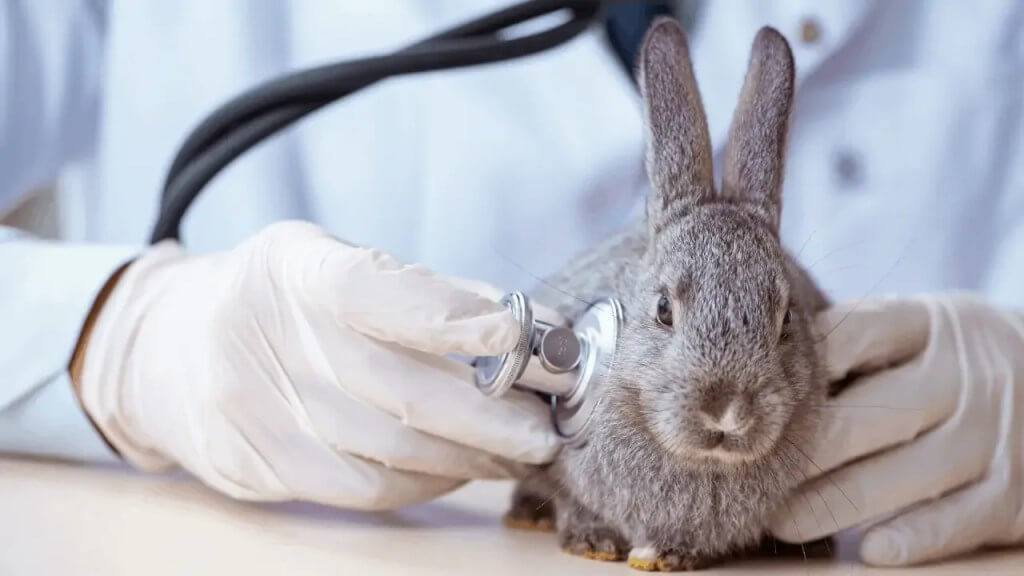
Bunny Veterinarian Care Resources
Where do you start, and what are trusted resources to help you find the right bunny match?
Start your search early before there is a problem!
- One excellent resource is the recommended veterinarian list ). Start here first to see if any recommended rabbit veterinarians close to you are good resources for emergency and routine veterinary care. Along with a link to find a veterinarian, there are also many online resources and information and blogs on important bunny facts and information that can be helpful in general bunny well-being and care and general rabbit conditions.
- Another site with specific small mammal veterinarian specialist lists is the . They have a link at the top of their page. Start here to see if there are any recommended small mammal veterinarians in your state that are members.
- If you are lucky to have one in your state, one other resource is an accredited veterinary school. While they may not see exotic small mammals, they may know of local veterinarians that give care and may be able to refer you to a specialist or ER facility that can get you proper care for your pet. You can find the list of accredited veterinary schools at the American Veterinary Medical Association.
- Lastly, while checking search engines can give you varied results, you can search for veterinarians who advertise as “exotic animal veterinarians”- this may get you to a clinic that has experience with rabbits, but we highly recommend other websites and doing further research before just allowing a search engine to dictate the care that your animal receives. If you are left with this search engine option, none of the above veterinary resources have given you a place that can see your beloved pet, below are some ways to see if you can find another veterinarian closer to you that may have experience with rabbits.
Bunny Veterinarian Search
Start by calling several veterinarians within 25-50 miles of your location and see if they see rabbits or if they can give you a referral to another clinic that is If you call several clinics and all give you the same hospital to refer to, you at least have a clear picture of someone who may see your pet.
Consider that you may have to drive several miles to find a veterinarian that sees rabbits and that you may have to pass many veterinarians on the way to find the best care for your beloved pet. But now the hard part starts, how do you know that they are a good, great or excellent rabbit veterinarian?
House Rabbit Society Offers List of Best Rabbit Veterinarian Care?
- If the rabbit veterinarian you find is in the House Rabbit Society recommended list or the AEMV list, you don’t need to do the below steps, but if you trust your search engine, you should consider some of the below questions and contact the veterinarian before your appointment for routine care. If this is an emergency, and you have not prepared for this, seek care where you can; the sooner treatment is started, the better the outcome will usually be!
- Assuming this is routine care, contact the veterinary office as the first step. While you may not get to speak to the veterinarian directly, you can directly ask the main office personnel.
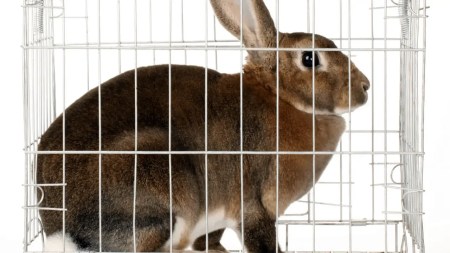
- How many rabbits does the veterinarian or clinic see on a daily, weekly, or monthly basis?
- Do they do wellness and routine care appointments?
- Are they equipped to do routine teeth trims and other minimally invasive surgical techniques on rabbits?
- Does the clinic routinely spay and neuter rabbits? If so, which doctors perform this procedure, and how many procedures do they do on an average week?
- Do they see house rabbits or pet rabbits and have information or general handouts that they can send you on routine care and routine illnesses in this species? If they have good handouts or resources, that is great! They are making sure you have the tools and good general information for the proper care of your pet. The handouts should have good general information on diet, housing, common illnesses, and medical treatment conditions.
-
-
- Diet: information on different types of hay and pellets that is recommended based on your pets life stage, as well as greens/veggies and recommended types and portions for your specific pet’s needs (A 2.5lb rabbit and a 20lb rabbit will require different amounts of food and may have different nutritional needs bases on age and breed.)
- Housing: Again, this is very important! Housing for your rabbit can vary, and the amount of space and exercise time needed is very important. Ensuring that your pet has a proper living environment and plenty of space and exercise can help prevent diseases like obesity, hock sores, and gastrointestinal disease.
- Common Illness: Many common diseases affect rabbits. Common conditions of pet rabbits include snuffles, hairballs, parasites, overgrown incisors, uterine infections or Cancer, sore hocks, and diarrhea. (While this is not a complete list, here is a few conditions that your veterinarian should be familiar with and have experience treating.)
-
-
- “Snuffles” is the lay term given to infection with bacterium. Most commonly, clinical signs are related to the eyes (discharge, redness, squinting) or nose (sneezing, discharge). Often the eyes and nose are affected at the same time. Pasteurella c Common pet rabbit conditions include snuffles, hairballs, parasites, overgrown incisors, uterine infections or Cancer, and sore hocks. Most cases of snuffles are mild. Treatment involves antibiotics. Due to potential problems with many oral antibiotics (especially oral penicillin and similar drugs, which can be fatal to rabbits), do NOT self-medicate your rabbit. Eye drops and nose drops prescribed by your veterinarian may be needed in selected cases.
- Hairballs are relatively common in rabbits, especially those who do not eat enough hay. Like cats and ferrets, rabbits are very clean animals and love to groom themselves. Occasionally, a lot of hair is swallowed during the grooming procedure and forms a ball in the stomach. Rabbits can’t vomit, and if the hair doesn’t pass through their intestinal tract, they will develop an obstruction. Hairballs are so common that they should always be considered a problem in any lethargic rabbit and not eating. Hairballs are best treated medically. Your doctor may also use fluid therapy and force-feeding to help encourage the hairball to pass through the intestinal tract. Otherwise, surgery is needed to remove the hairball. Medical intervention is usually successful and preferred over surgery. Feeding rabbits a diet high in hay (fiber) helps prevent hairballs and other intestinal problems. Daily brushing is also essential for removing excess dead hair.
- Parasites (internal or external) can be present in your pet rabbit, especially if they roam outside on the grass. They can also get external parasites such as fleas. Yearly microscopic fecal examinations will allow easy diagnosis and treatment. External parasites, such as fleas, ticks, mange, and ear mites, can also infect rabbits.
- Uterine Cancer is common in female rabbits; spaying early in life (by 4-6 months of age) can help prevent this. This type of Cancer is called uterine adenocarcinoma and is a relatively common condition in older female rabbits. It should be suspected anytime an un-spayed female rabbit becomes sick.
- “Sore hocks” is a condition that is relatively unique to rabbits. The hocks are essentially the ankles of rabbits. When a rabbit is sitting, which it does most of the time, its hocks are in contact with the floor of its cage. Often, wire-floored cages put too much pressure on the hocks, causing them to lose hair, turn red, and become ulcerated and painful. The condition is usually prevented by supplying an alternative substrate that is soft and has some give to prevent these pressure sores. A thick mattress of hay works the best to support the hocks and feet in the cage. Shredded paper or paper pellets in the litter box will also provide a softer contact.
- Diarrhea is often seen in rabbits. While it can be due to coccidia (a one-cell protozoan) or incorrect usage of oral antibiotics, usually, the cause can’t be determined. Rabbits eating a diet that is too high in carbohydrates (pellets, fruit, and treats) are more prone to develop intestinal problems than rabbits eating a high fiber (grass hay) diet. Treatment for diarrheal conditions of rabbits may include the use of proper antibiotics and probiotics. As a rule, the fiber in the diet is increased (often nothing but hay is offered for several weeks). Hospitalization and therapy are used as needed.
- Now that you know common conditions and what to do, it will be much easier to prepare and make sure you have information and sound resources to care for your pet.
Now you are ready to begin finding a veterinarian and clinic that can help your pet. You are now armed with the tools to ensure that you and your bunny have the best care and have the best chances of getting excellent care from an experienced rabbit veterinary doctor. Keep in mind that veterinary care can have significant cost and that seeing a “specialist “may cost more, but that intervention at the earliest time can make a huge difference in the cost of care and treatments that may be needed for your pet.
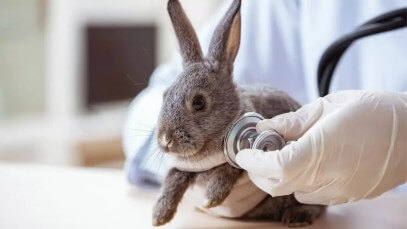
To Summarize How to Find a Good Rabbit Veterinarian
1. Start early and find a veterinarian through trusted resources that are knowledgeable in rabbit care.
2. Do not base your choice on a search engine advertisement or the proximity to your house. (unless it is an emergency)
3. Do your research and have an excellent primary care veterinarian and an emergency veterinarian selected ahead of time.
4. Seek out routine veterinary care AT LEAST once yearly to maintain a good patient/client relationship with your veterinarian. However, as your pet ages, they may require more frequent veterinary visits.
5. Seek care sooner rather than later; many interventions can be done early that can help treat your pet; this may result in quicker resolution for your pet and reduced cost of medical treatment for your pet.
6. Most of all, find a veterinarian you can trust and comfortable with. Care and treatment can be challenging with this species, and you need to find a veterinarian that you trust to give you the best care and best resources that you can. While not all conditions will require extensive treatment or care, some may, and you need to trust that your pet will be in safe hands.
About Brook-Falls
Brook-Falls Veterinary Hospital and Exotic Care is dedicated to providing quality care to all companion pets and exotic animals. Brook-Falls is a Menomonee Falls, WI-based full-service veterinary hospital with an extensive range of comprehensive medical, dental, diagnostic, and surgical services to meet the varying needs of all patients. Brook-Falls Veterinary also offers informational and educational media and seminars for pet owners by way of blogs, digital TV series (Expert Veterinary Television), e-books, whitepapers, infographics, and more.
For more information, contact Brook-Falls Veterinary Hospital & Exotic Care


